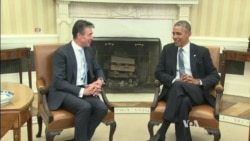NATO Secretary General Anders Fogh Rasmussen has met with President Barack Obama to discuss the pressing crises facing the alliance in two different parts of the world. Tuesday's meeting at the White House came as NATO prepares for a critical summit in September.
There were smiles as t Obama met Rasmussen in the Oval Office. But half a world away, in Afghanistan, their concerns were front and center. Four NATO soldiers were killed Tuesday in a suicide bombing in eastern Parwan province…while allegations of fraud marred the result of the country’s presidential election with both candidates claiming victory --- clouding NATO's future in the country.
“If there is no clarification before the NATO summit in September, then of course it’s hard to see how the security agreement can be signed before the summit and in that case we would be faced with severe problems as regards planning for a training mission after 2014,” said Rasmussen.
The U.S. has 31,000 troops in Afghanistan, with another 17,000 from the NATO-led International Security Assistance Force.
But without that new security agreement, those levels could drop to almost nothing, opening the door for more instability.
Then, there’s pressure from Russia, which continues to occupy Crimea and back separatists in eastern Ukraine.
“Given renewed concerns or new concerns - about Russian policy and Russian behavior, you’re going to see a renewed focus in NATO on the alliance’s original purpose, which was to provide for the collective defense,” stated former U.S. ambassador to Ukraine Steven Pifer.
The U.S. and NATO have taken steps to reassure members like Poland and the Baltic states, who are worried that Russia may try something similar against them.
But there are differences over how far NATO and its partners should go.
“I don’t think you can totally isolate a country like Russia, neither do we seek to do that but we are sending very clear signals that their policies are not acceptable and it has an economic price,” noted Swedish Foreign Minister Carl Bildt.
But others, like Jorge Benitez at the Atlantic Council say the U.S. and NATO have not been clear enough. “We’re very much risk averse here, and even though Putin is in a very much weaker position, he is willing to incur cost and pay the cost to enforce his position and that’s why his position is winning so far," he said.
Another concern for NATO - a lack of support for defense spending.
The secretary general says if all members met their minimum requirement, the alliance would have had an extra $90 billion …a critical issue at a time when NATO is facing threats on multiple fronts.





